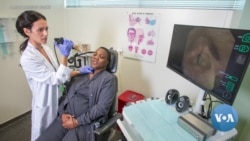ຜູ້ຊ່ຽວຊານດ້ານສຽງໄດ້ຮູ້ກັນມາແຕ່ດົນແລ້ວວ່າ ສຽງຂອງຄົນເຮົາສາມາດສະໜອງຂໍ້ມູນທີ່ສຳຄັນ ກ່ຽວກັບສຸຂະພາບທາງອາລົມ, ຮ່າງກາຍ ແລະຈິດໃຈຂອງເຂົາເຈົ້າໄດ້. ປັດຈຸບັນນີ້ ໂຄງການທີ່ໄດ້ຮັບທຶນຈາກລັດຖະບານສະຫະລັດ ກໍາລັງເກັບກໍາ ແລະວິເຄາະສຽງຫຼາຍພັນສຽງ ແລະນໍາໃຊ້ປັນຍາປະດິດເພື່ອວິນິດໄສພະຍາດ. ຈູລີ ທາໂບ (Julie Taboh) ຜູ້ສື່ຂ່າວວີໂອເອ ມີລາຍລະອຽດເລື້ອງນີ້ເພີ້ມເຕີມ ຊຶ່ງບົວສະຫວັນຈະນຳມາສະເໜີທ່ານໃນອັນດັບຕໍ່ໄປ.
ດຣ. ຢາແອລ ເບນຊູແຊນ (Yael Bensoussan) ກຳລັງ ກວດເບິ່ງຫລອດ ສຽງຂອງຄົນເຈັບ.
ຢູ່ທີ່ສູນສຸຂະພາບສຽງ ຂອງມະຫາວິທະຍາໄລລັດຟລໍຣິດາໃຕ້ນັ້ນ ທ່ານນາງປິ່ນ ປົວ ຄົນເຈັບ ທີ່ມີຄວາມຜິດປົກກະຕິທາງສຽງ, ເຊັ່ນ: ຄວາມຜິດປົກະຕິຂອງທາງ ເດີນຫາຍໃຈສ່ວນເທິງ, ສຽງ ແລະການກືນອາຫານ.
ແລະເມື່ອບໍ່ດົນມານີ້, ທ່ານນາງໄດ້ຊ່ວຍນໍາພາໂຄງການໃຫມ່ ເພື່ອສ້າງຖານ ຂໍ້ມູນຂອງການບັນທຶກສຽງມະນຸດ 30,000 ຄົນ ແລະຝຶກຄອມພິວເຕີໃຫ້ຮູ້ກວດ ຫາພະຍາດຜ່ານການປ່ຽນແປງຂອງສຽງມະນຸດ.
ດຣ. ເບນຊູແຊນ ກ່າວຜ່ານທາງ SKYPE ວ່າ:
"ບໍ່ພຽງແຕ່ສ້າງຖານຂໍ້ມູນເທົ່ານັ້ນ ແຕ່ຍັງຈະພັດທະນາຄຳແນະນຳກ່ຽວກັບວິທີ ການແບ່ງປັນຂໍ້ມູນ, ວິທີການເກັບກໍາຂໍ້ມູນ, ແລະວິທີການນໍາໃຊ້ຂໍ້ມູນເຫລົ່ານັ້ນ ສໍາລັບການຄົ້ນຄວ້າຂອງ AI ຫລື ປັນຍາປະດິດໃນອະນາຄົດອີກດ້ວຍ."
ທ່ານນາງເຮັດວຽກກັບທີມງານນັກຄົ້ນຄວ້າ 45 ຄົນ ຈາກ 12 ວິທະຍາໄລທີ່ ແຕກຕ່າງກັນ ໃນອາເມຣິກາເຫນືອ ພ້ອມກັບບໍລິສັດຕັ້ງໃໝ່ໃນຢູໂຣບ.
ພວກເຂົາເຈົ້າສຶກສາຕົວຢ່າງສຽງ ເພື່ ອຊ່ວຍເຂົາເຈົ້າໃນການກວດຫາພະຍາດ ຕ່າງໆ ເຊັ່ນພະຍາດພາຣ໌ກິນສັນ (Parkinson)… ມະເຮັງ… ແລະຄວາມ ຜິດປົກກະຕິຂອງສຽງເຊັ່ນ ຫລອດສຽງເປັນອໍາມະພາດ...
ທີມງານຍັງສຶກສາຄວາມຜິດປົກກະຕິທາງດ້ານອາລົມເຊັ່ນ: ພາວະຊຶມເສົ້າ ແລະ ຄວາມກັງວົນໃຈ.
ດຣ. ເບນຊູແຊນກ່າວຜ່ານທາງ SKYPE ອີກວ່າ: "ສະນັ້ນ, ເມື່ອຜູ້ໃດຜູ້ນຶ່ງມີໂຣກຊຶມເສົ້າ, ໂສກເສົ້າ, ຄວາມກັງວົນໃນໃຈ, ແນ່ ນອນ, ສຽງເວົ້າຂອງພວກເຂົາກໍຈະປ່ຽນໄປ."
ການສຶກສານີ້ ແມ່ນນຶ່ງໃນສີ່ໂຄງການຜະລິດສາງຂໍ້ມູນທີ່ໄດ້ຮັບທຶນສະໜັບ ສະໜຸນຈາກໂຄງການຂົວຕໍ່ໃສ່ກັບປັນຍາປະດິດ ຫລື Bridge to Artificial Intelligence program ຂອງສະຖາບັນສຸຂະພາບແຫ່ງຊາດ ຊຶ່ງຖືກອອກ ແບບມາ ເພື່ອນໍາໃຊ້ AI ຮັບມືກັບສິ່ງທ້າທາຍດ້ານຊີວະແພດທີ່ສັບສົນ.
ດຣ. ເບນຊູແຊນ ກ່າວຜ່ານທາງ SKYPE ວ່າ: "ພວກເຂົາເຈົ້າຮັບຮູ້ວ່າ ມີຊ່ອງຫວ່າງອັນໃຫຍ່ຫຼວງເຊັ່ນນັ້ນ ລະຫວ່າງເທັກໂນໂລຈີ ທີ່ພວກເຮົາມີຢູ່ ແລະຄວາມຮູ້ທາງດ້ານການແພດ, ແລະສິ່ງທີ່ພວກເຮົາ ໃຊ້ໃນການປິ່ນປົວທາງດ້ານການແພດ ຢູ່ໃນໂຮງຫມໍຂອງພວກເຮົາ."
ແລະການເຮັດເຊັ່ນນັ້ນ ໃນຂະນະທີ່ຮັກສາຄວາມເປັນສ່ວນຕົວຂອງຜູ້ເຂົ້າຮ່ວມ ໄວ້.
ທ່ານນາງແກຣດສ໌ ເພງ (Grace Peng) ແມ່ນນຶ່ງໃນຜູ້ປະສານງານຂອງໂຄງ ການ Bridge2AI ຂອງສະຖາບັນສຸຂະພາບແຫ່ງຊາດ. ທ່ານນາງເວົ້າກັບ ວີໂອເອຜ່ານທາງ Zoom ວ່າ:
“ພວກເຮົາຕ້ອງຄຳນຶງເຖິງຈັນຍາບັນ ທີ່ຕິດພັນກັບການເກັບກຳສຽງຂອງຄົນ. ແລະ ພວກເຮົາຈະຮັກສາຄວາມເປັນສ່ວນຕົວໄດ້ແນວໃດ?”
ການສຶກສາທີ່ວ່ານີ້ຈະເລີ່ມໃຫ້ຜູ້ເຂົ້າຮ່ວມຈົດຊື່ລົງທະບຽນໃນປີຈະມານີ້.
ອ່ານຂ່າວນີ້ເພີ້ມເປັນພາສາອັງກິດຢູ່ລຸ່ມນີ້:
Voice experts have long known that a person's voice can provide important information about their emotional, physical and mental health. Now a U.S. government-funded project is collecting and analyzing thousands of voices and using artificial intelligence to diagnose illnesses. VOA’s Julie Taboh has more.
Dr. Yael Bensoussan ((ben—SOO-san)) examines the vocal cords of a patient.
At the University of South Florida Health Voice Center, she treats patients with a range of voice disorders, such as upper airway, voice and swallowing disorders.
And lately, she’s been helping to lead a new project to build a database of 30,000 human voice recordings and train computers to detect diseases through changes in the human voice.
Dr. Yael Bensoussan, Voice Specialist via SKYPE
“Not only to build that data, but also to develop the guidelines on how to share that data, how to collect that data, and also how to use that data for future AI [artificial intelligence] research.”
She works with a team of 45 investigators across 12 different universities in North America as well as a startup in Europe.
They study voice samples to help them detect illnesses like Parkinson’s disease…
Glottic cancer voice demo, Text on graphic: "Glottic cancer"
cancer… And voice disorders such as vocal fold paralysis…
The team also studies mood disorders such as depression and anxiety.
Dr. Bensoussan via SKYPE: “So when somebody is depressed, sad, has anxiety, of course their speech changes.”
The study is one of four data-generation projects funded by the National Institutes of Health's Bridge to Artificial Intelligence program, designed to use AI to tackle complex biomedical challenges.
Dr. Bensoussan via SKYPE: “They realized that there was such a big gap between the technology that we had available, and the clinical knowledge, and what we use in clinical care in our hospitals."
And doing it while maintaining participants’ privacy.
Grace Peng is one of the coordinators of the National Institutes of Health’s Bridge2AI program. She spoke with VOA via Zoom:
“We want to think about the ethics associated with collecting people's voices. And how do we keep it private?”
The study will start enrolling participants in the coming year.










